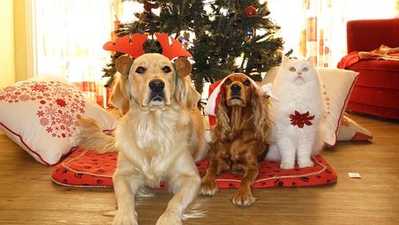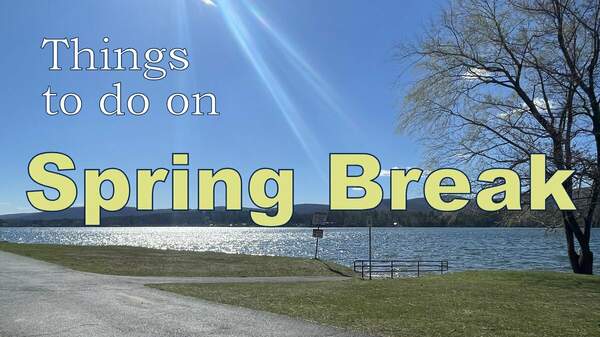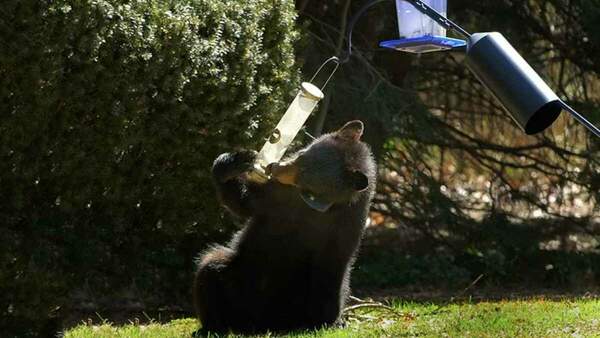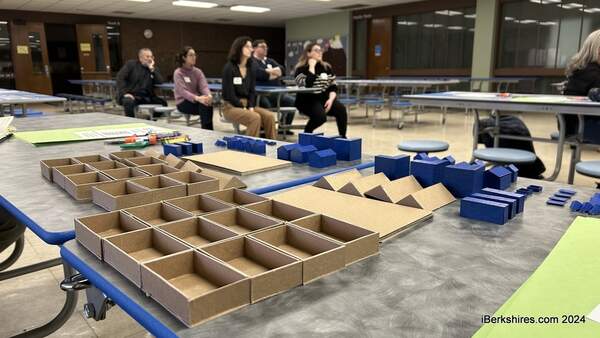Department of Agricultural Resources Has Tips to Keep Pets Safe This Holiday Season
 |
BOSTON — The state Department of Agricultural Resources' Division of Animal Health is reminding residents to ensure their pets remain safe and healthy by planning ahead when traveling and being aware of potentially harmful holiday foods and decorations.
"I want all families to enjoy the holiday season with their pets by planning ahead and being aware of how holiday decorations, food and even new guests in a home may affect pet health," said MDAR Commissioner John Lebeaux. "I encourage residents to talk with their local veterinarian to discuss what types of holiday plants and other greenery items are safe to have indoors and to purchase them from a local greenhouse or nursery operation."
Collars and identification tags are valuable when traveling in case you become separated from your pet.
"In unfamiliar surroundings, an animal can act differently than normal, often more fearful, and be at higher risk of becoming lost," Pam Peebles, executive director of the Thomas J O'Connor Animal Control and Adoption Center, said. "As an animal control center, we use local registries, social media and other tools to get animals back to their families as fast as possible.
"However, when animals that are not local are lost, those same tools are far less effective, leaving us to rely very heavily on the basic collar and ID tag. When an animal comes in with an ID tag, the relief we feel is immeasurable as we know this animal’s family is only a phone call away. A collar and ID tag can truly be a lost pet's ticket home and there is no place like home."
Follow these tips to ensure you and your pets are ready for this holiday season:
Plan Ahead for Emergencies:
1. Have your veterinarian’s contact information in an easily accessible location in case an emergency occurs. Familiarize yourself with emergency animal clinics in your area that can provide 24/7 service in case your pet needs attention on late nights or weekends.
Holiday Travel:
1. Pets should wear collars and ID tags whenever traveling. Do not forget the leash or carrier for when they are outside.
2. Just like you pack a travel bag for yourself; pack one for your pet too. Bring food, bowls, medications and copies of veterinary medical records in case something happens and you are far from your regular veterinarian.
3. Pack your pet’s favorite toys to comfort them in a different environment.
Holiday Decorations:
1. Christmas trees and decorations are appealing to us as well as our pets. Avoid using breakable ornaments and tinsel as those items can be harmful if swallowed. If possible, secure your tree to the ceiling or a door frame to prevent it from falling over when being examined or climbed by curious or athletic pets.
2. Cover the water in your tree base so your pet doesn’t drink from it.
3. Never leave a pet unattended in a room with a candle and watch those pets swinging tails near them.
Holiday Food:
1. Avoid giving table scraps to pets. Some foods can be hard for the pet to digest, while others can actually be harmful.
2. Keep pets away from the dessert table, since common items that are safe for people like chocolate, macadamia nuts, raisins etc., can be toxic to pets.
3. Do not leave edible gifts under the tree unattended.
Pet Friendly Indoor Plants:
The plants below are considered non-toxic to pets by the American Society for the Prevention of Cruelty to Animals (ASPCA).
-
Christmas Cactus (Schlumbergera bridgesii)
- Boston Fern (Nephrolepis exalta bostoniensis)
- Dancing Doll Orchid (Oncidium flexuosum)
- African Violet (Saintpaulia spp.)
- Hens and Chickens Succulent Plants (Echeveria elegans)
- Rose (Rosa Species)
- Christmas Dagger Fern (Polystichum acrostichoides)
- Gerber Daisy (Gerbera jamesonii)
- Basil (Ocimum basilicum)
- Christmas Orchid (Cattleya trianaei)
- Rubber Plant (Peperomia obtusifolia)
- Thyme (Thymus vulgaris)
- Bamboo (Phyllostachys aurea)
If you suspect your pet has ingested plant material and is vomiting, experiencing an upset stomach or a lack of energy, call your veterinarian. To search for a specific plant visit the ASPCA's full list here.
For more information on holiday pet safety tips, visit MDAR’s Mass Animal Fund website here.
Tags: holiday story, pets,















